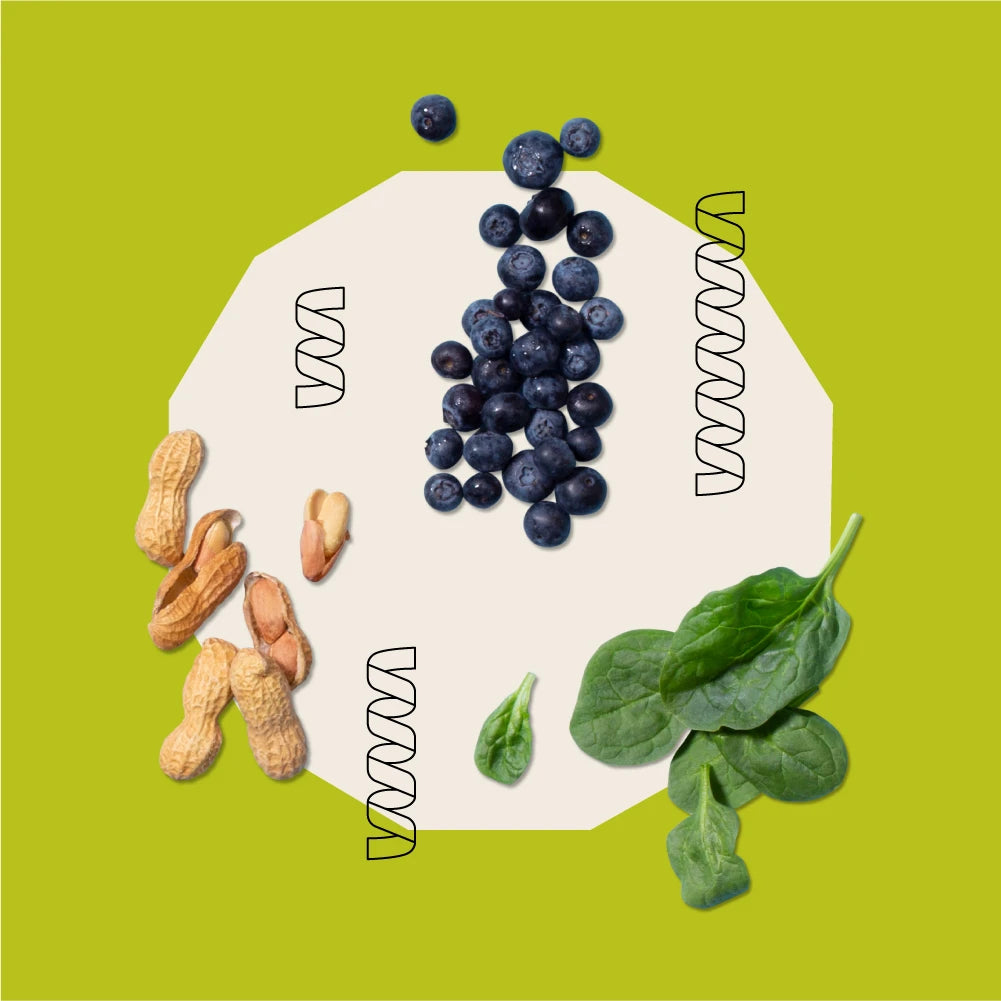The Evolution of Dogs
Explore the scientific evidence to support that dogs have evolved along with humans and diverged from their predecessors, wolves.

It’s in Their Genes
Amy2B copy number variation reveals starch diet adaptations in ancient European dogs.
It’s in Their Genes
Amy2B copy number variation reveals starch diet adaptations in ancient European dogs.
This evidence further demonstrates the genetic distinction between dogs and wolves.
Bergstrom et al, Nature (2022)
While it is known that the grey wolf (Canis lupus) gave rise to present-day dogs (Canis familiaris), the questions of where, when and how this happened remain. The current consensus on when the ancestors of dogs and modern wolves diverged ranges from 40–14 thousand years ago. These researchers analyzed 72 ancient wolf genomes spanning the last 100,000 years from Europe, Siberia and North America, and concluded that dogs were likely to have been domesticated in the east, and that a second separate domestication event likely occurred. None of the analyzed ancient wolf genomes is a direct match for either of these dog ancestries, meaning that the exact progenitor populations of modern dogs remain to be located.
Tiffany Ruiz Dasilva, VMD, cVMA | Professional Services Veterinarian, Wild Earth
Your Dog is Not a Wolf
Grey Wolf Genomic History Reveals a Dual Ancestry of Dogs
Your Dog is Not a Wolf
Grey Wolf Genomic History Reveals a Dual Ancestry of Dogs
This evidence further demonstrates the genetic distinction between dogs and wolves.
Bergstrom et al, Nature (2022)
While it is known that the grey wolf (Canis lupus) gave rise to present-day dogs (Canis familiaris), the questions of where, when and how this happened remain. The current consensus on when the ancestors of dogs and modern wolves diverged ranges from 40–14 thousand years ago. These researchers analyzed 72 ancient wolf genomes spanning the last 100,000 years from Europe, Siberia and North America, and concluded that dogs were likely to have been domesticated in the east, and that a second separate domestication event likely occurred. None of the analyzed ancient wolf genomes is a direct match for either of these dog ancestries, meaning that the exact progenitor populations of modern dogs remain to be located.
Tiffany Ruiz Dasilva, VMD, cVMA | Professional Services Veterinarian, Wild Earth
Thousands of Years in the Making
Genome Sequencing Highlights the Dynamic Early History of Dogs
Thousands of Years in the Making
Genome Sequencing Highlights the Dynamic Early History of Dogs
This study found that dogs and wolves diverged 11,000–16,000 years ago.
Freedman et al, The PLOS Genetics Staff (2014)
Much remains unknown about when, where and how dogs were domesticated. These authors set out to identify the genetic changes that occurred during the course of dog domestication in order to help shed light on their evolutionary history. The authors compared the genomes (DNA) of three gray wolves, each from one of the main centers of dog domestication, a Basenji, an Australian Dingo, and a golden jackal. In doing so, the authors were able to determine that dogs likely were initially domesticated 11,000 – 16,000 years ago, prior to the agricultural revolution. Moreover, since their domestication they experienced a 16-fold reduction in population size, which is a very severe bottleneck, along with post-divergence gene flow from wolves. Wolves also experienced a severe bottleneck following their split from dogs, and none of the sampled wolves were more closely related to dogs, which supports the hypothesis that the population of wolves that gave rise to dogs may have gone extinct.
Tiffany Ruiz Dasilva, VMD, cVMA | Professional Services Veterinarian, Wild Earth
Can Dogs Get All Their Protein From Plants?
Explore the scientific evidence to support that plant-based options are appropriate as the main source of protein in a dog’s diet.

The Proof is in the Results
The impact of vegan diets on indicators of health in dogs and cats: A systematic review
The Proof is in the Results
The impact of vegan diets on indicators of health in dogs and cats: A systematic review
This comprehensive literature review included 16 scientific studies, and concluded that there is no overwhelming evidence of adverse effects resulting from the feeding of vegan diets in dogs (or cats), and that there is evidence of benefits.
Dominguez-Oliva et al, Veterinary Sciences, 2023
This group of researchers set out to conduct a systematic review of the health impacts of a vegan diet in cats and dogs using established methods of evidence synthesis. The authors identified 16 scientific studies (1992 – 2022) that met their criteria – dogs or cats in a domestic setting fed a vegan or vegetarian diet with outcomes related to animal health, physiology or welfare measures. Eligible studies were critically appraised for methodological quality, and underwent data extraction and synthesis. For canines, twelve studies examined outcomes in dogs that were fed vegan diets (nine of those measured outcomes directly), and four studies used guardian reports on health outcomes or perceptions of health. The results demonstrated that the majority of the objective animal-based parameters were within normal reference ranges, and for those that deviated from normal, there were rarely clinical signs reported alongside the finding. Further, while there are commonly references in the broad literature to concerns around nutrient deficiencies, there is limited evidence of these deficiencies arising, and in most instances confounding factors were present. The authors concluded that there is no overwhelming evidence of adverse effects resulting from the feeding of vegan diets in dogs (or cats), and that there is evidence of benefits. If pet parents wish to feed a vegan diet, it is recommended that commercial foods are used.
Tiffany Ruiz Dasilva, VMD, cVMA | Professional Services Veterinarian, Wild Earth
All Signs Point to Plant-Based
Domestic dogs maintain positive clinical, nutritional, and hematological health outcomes when fed a commercial plant-based diet for a year
All Signs Point to Plant-Based
Domestic dogs maintain positive clinical, nutritional, and hematological health outcomes when fed a commercial plant-based diet for a year
This most recent, comprehensive, and first long-term study revealed that health was maintained in dogs fed a complete and balanced plant-based diet for a year.
Linde et al, Archives of Clinical and Biomedical Research, 2023
A group of clinician-scientists from Western University published the longest and most comprehensive study on plant-based feeding in dogs to date. Fifteen clinically healthy dogs were fed a complete and balanced plant-based diet for a year (Linde et al., 2023). Clinical, hematological, and nutritional parameters were evaluated at 0, 6 and 12 months, including complete blood count, serum chemistry, cardiac biomarkers, plasma amino acids, and serum vitamin concentrations. Comparative analysis of blood work and urinalysis showed no clinically significant changes between baseline, intermediate, and endpoint values. Furthermore, CBC and blood chemistry values remained within normal reference ranges throughout the study. Levels of essential amino acids were assessed and all were within or above normal reference ranges, with an upward trend. L-taurine (plasma) and L-carnitine (serum) levels were also measured due to their importance to myocardial health and the fact that both have been used as nutritional supplements in reference to canine dilated cardiomyopathy (DCM). A statistically non-significant increase in these nutrients was observed when comparing baseline to endpoint values. Seven dogs presented with vitamin D insufficiency as a result of eating a meat-based diet prior to the start of the study, and at six months of eating a plant-based diet, only one dog was insufficient – and by 12 months all dogs had normal vitamin D levels. As for vitamin A, concentrations stayed within the reference range and exhibited an upward trend. Vitamin E levels were more than adequate throughout. Lastly, as for B vitamins, folate was below the reference range in six dogs at the outset of the study and by 12 months only three of those dogs had low folate. Cobalamin was within the normal reference interval at all three time points. In order to evaluate heart health, cardiac biomarkers Cardiac troponin I (cTnI) and NT-proBNP were measured at the three time points, and not only did they maintain within reference ranges, but there was a downward trend in both. Furthermore, cTnI levels were increased in three dogs at baseline, compared to only one dog at endpoint. Given the results, the authors concluded that health was maintained after 12 months of being fed a commercial plant-based diet.
Tiffany Ruiz Dasilva, VMD, cVMA | Professional Services Veterinarian, Wild Earth
Protein is Protein
Use of legumes and yeast as main protein sources in extruded canine diets
Protein is Protein
Use of legumes and yeast as main protein sources in extruded canine diets
This study concluded plant-based protein sources and yeast are comparable to traditional poultry diets, and are appropriate protein sources for canine diets.
Reilly et al, Frontiers in Veterinary Science (2021)
The objective of this study was to evaluate legumes and yeast as protein sources in extruded canine diets, in order to provide information about the effects on digestibility, gastrointestinal tolerance, and fermentative end-products of novel plant-based proteins in dogs. Five diets were formulated using either garbanzo beans, green lentils, peanut flour, dried yeast, or poultry byproduct meal as the primary protein source, and fed to ten adult female beagles. The authors concluded that novel plant-based protein sources and yeast are comparable to traditional poultry byproduct meal diets, and are appropriate protein sources for canine diets.
Tiffany Ruiz Dasilva, VMD, cVMA | Professional Services Veterinarian, Wild Earth
Dogs Need Protein, Plants Have Protein
Ileal and total tract nutrient digestibilities and fecal characteristics of dogs as affected by soybean protein inclusion in dry, extruded diets
Dogs Need Protein, Plants Have Protein
Ileal and total tract nutrient digestibilities and fecal characteristics of dogs as affected by soybean protein inclusion in dry, extruded diets
Soy protein concentrate offers a viable alternative to poultry meal as a protein source in dry, extruded canine diets.
Clapper et al, Journal of Animal Science (2001)
It is well known that plant-based protein sources are generally less variable in chemical composition than animal-based protein sources, however not much is known about the nutrient digestibilities of plant-based protein sources by companion animals. These authors set out to determine the effects of soybean protein sources on nutrient digestion and fecal characteristics. Six diets with differing protein sources were formulated to be isonitrogenous and isocaloric, extruded and kibbled. The protein sources used were soybean meal, Soyafluff 200W (soy flour), Profine F (traditional aqueous-alcohol extracted soy protein concentrate), Profine E (extruded soy protein concentrate), Soyarich I (modified molecular weight SPC) and poultry meal. Ileal and total tract crude protein digestibility, as well as apparent amino acid digestibilities at the terminal ileum, excluding methionine, threonine, alanine and glycine, were higher for soy protein-containing diets than for poultry meal. The authors concluded that soy protein sources are well utilized by the dog prior to the terminal ileum, and soy protein concentrate offers a viable alternative to poultry meal as a protein source in dry, extruded canine diets.
Tiffany Ruiz Dasilva, VMD, cVMA | Professional Services Veterinarian, Wild Earth
The Power of Plants
An experimental meat-free diet maintained haematological characteristics in sprint-racing sled dogs
The Power of Plants
An experimental meat-free diet maintained haematological characteristics in sprint-racing sled dogs
This study is the first to demonstrate that a carefully balanced meat-free diet can maintain normal hematological values in exercising dogs.
Brown et al, British Journal of Nutrition (2009)
Sprint-racing sled dogs were fed a plant-based diet vs. a meat-based diet. Hematology results for all dogs, irrespective of diet, were within normal range throughout the study, and all dogs remained in excellent physical condition.
Tiffany Ruiz Dasilva, VMD, cVMA | Professional Services Veterinarian, Wild Earth
It’s All About Balance
Short-term amino acid, clinicopathologic, and echocardiographic findings in healthy dogs fed a commercial plant-based diet
It’s All About Balance
Short-term amino acid, clinicopathologic, and echocardiographic findings in healthy dogs fed a commercial plant-based diet
The results of this study indicated that the health of the dogs was maintained after 12 weeks on a plant-based diet.
Cavanaugh et al, PLOS ONE (2021)
Evidence supporting the health-promoting effects of plant-based diets in humans continues to grow. Studies evaluating the effects of plant based diets on canine health are lacking, however. The authors of this study set out to evaluate the short-term effects of a commercial extruded plant-based diet (PBD), using pea as the main protein source, in 30 dogs, and compared these dogs to a non-randomized control group of 4 dogs fed different brands of commercial extruded traditional diets (TD). In conclusion, the results of this study indicated that the health of the dogs was maintained and did not deteriorate after 12 weeks on a PBD. As with traditional diets, not all plant-based diets are equal since composition and nutrient availability vary based on formulation and processing so it is important to choose a nutritionally complete and balanced diet to feed your pet.
Tiffany Ruiz Dasilva, VMD, cVMA | Professional Services Veterinarian, Wild Earth
Can Dogs Digest Carbohydrates?
Explore the scientific evidence to support that dogs can properly digest a wide variety of carbohydrate sources.

All Carbs are Created Equal
Evaluation of Nutrient Utilization in the Canine Using the Ileal Cannulation
All Carbs are Created Equal
Evaluation of Nutrient Utilization in the Canine Using the Ileal Cannulation
Starch digestion was complete (>98%) within the small intestine and was unaffected by the carbohydrate source.
Walker et al, The Journal of Nutrition (1994)
In this study, the researchers cannulated the terminal ileum of nine mature mongrel dogs, and in an effort to determine the effect of carbohydrate source on starch and dry matter digestion. The ileal T-cannula allows for measurement of small intestinal nutrient disappearance without the confounding effects of colonic microflora. Two experiments were performed evaluating the effect of carbohydrate source on ileal starch and dry matter digestibility. Dogs were fed two meals daily with Cr2O3 used as a digesta marker. Diets contained 67% extruded grain (corn, rice, oats or barley) and 33% canned meat supplement on a dry matter basis. In the first experiment, prececal and total tract dry matter digestibilities were higher for rice than corn, and in the second experiment, barley was higher than oats. The starch from all grains, however, was complete (>98%) within the small intestine and was unaffected by carbohydrate source. This study further demonstrates that dogs readily digest starches in commercial pet foods, and provides evidence to support that they can thrive on a plant-based diet.
Tiffany Ruiz Dasilva, VMD, cVMA | Professional Services Veterinarian, Wild Earth
Optimal Digestion
The genomic signature of dog domestication reveals adaptation to a starch-rich diet
Optimal Digestion
The genomic signature of dog domestication reveals adaptation to a starch-rich diet
This study demonstrates the ability of modern dogs to thrive on a diet rich in starch, relative to the carnivorous diet of wolves.
Axelsson et al, Nature (2013)
Given the lack of information regarding the genetic changes that accompanied the transformation of ancient wolves into domestic dogs, a group of researchers set out to compare all of the genes in the genome (DNA) of dogs to the genome of wolves. They determined that of the 3.8 million genetic variants identified, 36 genomic regions were likely found to represent targets for selection during dog domestication. These regions contained genes that fell into two main categories – those genes important in brain function, and likely responsible for behavior traits, and those responsible for starch digestion. So what does this mean? Dogs can thrive on a high quality, well formulated plant-based diet that meets all of their nutritional needs. The ability of modern dogs to thrive on a diet rich in starch, relative to the carnivorous diet of wolves, constituted a crucial step in the early domestication of dogs.
Tiffany Ruiz Dasilva, VMD, cVMA | Professional Services Veterinarian, Wild Earth
Fat vs. Starch
Differences in Metabolic Profiles of Healthy Dogs Fed a High-Fat vs. a High-Starch Diet
Fat vs. Starch
Differences in Metabolic Profiles of Healthy Dogs Fed a High-Fat vs. a High-Starch Diet
Canines cannot only process carbohydrates, but starch digestion can also confer benefits not seen with digestion of fats. Results indicate that a high-starch diet, compared to a high-fat diet, may promote lipid metabolism, protein biosynthesis, have anti-oxidative effects and other benefits in healthy, lean dogs.
Lyu et al, Frontiers in Veterinary Science (2022)
Current studies report that about 34 to 60% of canines are overweight or obese, which can lead to decreased longevity, and increased risk of certain health issues such as insulin resistance, hypertension, cardiovascular disease, and osteoarthritis. In both canines and humans alike, inflammation is a common feature that has been implicated in the pathophysiology of many of these obesity-associated disorders. In this study, ten healthy lean adult beagles were separated into two groups to compare the inflammatory response of those fed a high-starch diet and a high-fat diet. The results of the study concluded that there was no difference was found in the inflammatory response in dogs of both groups, however the high-starch diet, when compared to a high-fat diet, may promote lipid metabolism, protein biosynthesis and catabolism, have anti-oxidative effects, improve mucosal barrier function and immunomodulation in healthy lean dogs. All in all, non-fibrous carbohydrates, which are some of the main energy-delivering nutrients in traditional dog food, do provide an added benefit to canines.
Tiffany Ruiz Dasilva, VMD, cVMA | Professional Services Veterinarian, Wild Earth
Reported Health Benefits of Plant-based Diets
Explore the results from multiple population studies that showed complete and balanced vegan diets for dogs were reported to be the least hazardous, lead to fewer health disorders and increased longevity.

Seeing is Believing
Owner perception of health of North American dogs fed meat- or plant-based diets
Seeing is Believing
Owner perception of health of North American dogs fed meat- or plant-based diets
Owners feeding plant-based diets to their dogs reported fewer health disorders, and longevity was reported to be greater for these dogs, with purely plant-based dogs reportedly living 1.5 years longer than dogs fed meat.
Dodd et al, Research in Veterinary Science (2022)
In order to describe owner perception of health and wellbeing of dogs fed plant-based versus meat-based diets, this study surveyed a sample of dog owners from Canada and the USA. Pet owners were given a web-based questionnaire to collect data on dog characteristics, husbandry, health and wellbeing. Diet information was collected for 1189 dogs, with half (665/1189, 56%) being fed a meat-based diet, a third (357/1189, 30%) being fed a strictly plant-based diet, and few being fed a combination (63/1189, 5%) or indeterminable (104/1189, 9%). Owners feeding plant-based diets to their dog reported fewer health disorders, and longevity was reported to be greater for these dogs. The results might suggest an association between feeding a plant-based diet and perceived health and longevity, however inherent bias and limitations associated with surveys of owner perception must be considered.
Tiffany Ruiz Dasilva, VMD, cVMA | Professional Services Veterinarian, Wild Earth
Plants vs. Meat
Vegan versus meat-based dog food: Guardian-reported indicators of health
Plants vs. Meat
Vegan versus meat-based dog food: Guardian-reported indicators of health
This research studied 2,536 dogs fed vegan or meat-based diets for at least one year. They concluded that the healthiest diets for dogs are nutritionally sound plant-based diets.
Knight et al, Plos One (2022)
In order to assess the nutritional suitability of vegan diets for dogs, the authors, having previously assessed the steps taken by vegan pet food manufacturers to ensure the quality and nutritional soundness of their products, set out to assess the health status of dogs maintained on different diets. A survey was conducted in which pet owners were asked about the main ingredient in their pet’s normal diet, in addition to providing information about seven general indicators of health, and about the prevalence of specific health disorders, for the previous year. Of the 2,639 dog guardians, 2,536 dogs were maintained on one of the three main diets identified, with 54% fed a commercial meat diet, 33% fed a raw meat diet, and 13% fed a vegan diet for at least one year. Overall, dogs fed conventional diets fared the worst, with dogs being fed raw diets faring slightly better than those fed vegan diets. The authors attributed this to the statistically significant differences in average ages, with dogs fed raw meat being younger, which is generally associated with improved health outcomes. Once the ages of the dogs were adjusted for using a variance (Anova) test, it was found that the mean health score for the two factor groups of dogs with varying ages and diets is highest for vegan diets across all age groups. Additionally, the authors considered the prevalence of 22 specific health disorders, based on predicted veterinary assessments, and the percentage of dogs suffering from a health disorder were 49%, 43% and 36% for conventional meat, raw, and vegan diets respectively.
Tiffany Ruiz Dasilva, VMD, cVMA | Professional Services Veterinarian, Wild Earth
Pet Parents Watch the Change
Reported Health Benefits of a Vegan Dog Food – A Likert Scale-type Survey of 100 Guardians
Pet Parents Watch the Change
Reported Health Benefits of a Vegan Dog Food – A Likert Scale-type Survey of 100 Guardians
For dogs who were fed a vegan dog food, clear improvements after 3-12 months were reported in coat glossiness, dandruff, skin inflammation, itchiness, external ear canal crusting, fecal consistency, defecation frequency, flatus frequency, antisocial smell, anxiety, aggressive behavior and stool consumption.
Davies, bioRXiv (2022)
In an effort to quantify perceived health changes in dogs fed a vegan dog food, the authors of this study invited dog owners who had been feeding a single brand of veterinary-formulated, UK-produced vegan food for a period of 3 to 12 months to participate in a Likert Scale-type survey of observations reflecting health status. The main ingredients incorporated into the plant-based pet food recipes included potato protein, pea starch, soya, brown rice, Sweet potato, Dried Brewers Yeast, Oats, Peas, Pea Protein, Carrot and Rapeseed Oil. One hundred guardians completed the survey, and improvements were observed in fecal consistency, frequency of defecation, flatulence frequency, flatulence smell, coat glossiness, scales on the skin (dandruff), redness of the skin (erythema, inflammation), crusting of the external ear canals (otitis externa), itchiness, anxiety, aggressive behavior and coprophagia.
Tiffany Ruiz Dasilva, VMD, cVMA | Professional Services Veterinarian, Wild Earth
Made to be Healthier
The Nutritional Soundness of Meat-Based and Plant-Based Pet Foods
Made to be Healthier
The Nutritional Soundness of Meat-Based and Plant-Based Pet Foods
Upon review, plant-based diets were seen to have been produced at equal or superior standards to meat-based diets, with acceptable or superior standards overall at all stages of formulation and production.
Knight et al, Revista Electronica De Veterinaria (2021)
One of the most common reasons for not adopting a plant-based pet diet is a lack of evidence supporting the nutritional sufficiency of plant-based diets in dogs. The purpose of this study was to examine the steps taken to ensure the nutritional soundness and quality of pet foods, and whether plant-based diets have lower standards in these respects. The authors surveyed pet food manufacturers primarily based in the UK, other European nations, US, Asia, and Australia/New Zealand producing 19 meat-based and 10 vegan, almost vegan or vegetarian pet foods. The survey aimed to explore the steps taken to ensure nutritional soundness and quality control of their product, and qualitatively assess each stage as inferior, acceptable or superior based on whether 50% of the diets within each group (70% for superior) fulfilled the majority of the criteria. The steps assessed included diet formulation expertise, diet formulation soundness (such as feeding trial vs formulation vs other), ingredients, nutritional supplementation, physical preservation, preservation additives including antimicrobials, nutrient degradation monitoring, nutrient degradation adjustment, and storage and shipping. At almost all stages of the formulation, manufacturing and distribution processes, these companies were assessed as having acceptable or superior standards overall, with plant-based diets almost always producing to standards equal or superior to those of meat-based diets.
Tiffany Ruiz Dasilva, VMD, cVMA | Professional Services Veterinarian, Wild Earth
Top Food-Related Allergens For Dogs
Explore the scientific evidence that shows the top food-related allergens for dogs are most commonly from animal-sourced ingredients.
Meat Might be the Culprit
Critically appraised topic on adverse food reactions of companion animals (2): common food allergen sources in dogs and cats
Meat Might be the Culprit
Critically appraised topic on adverse food reactions of companion animals (2): common food allergen sources in dogs and cats
For dogs, the most frequently reported food allergens involved in cutaneous adverse food reactions (CAFR) were beef (34 %), dairy products (17 %) and chicken (15 %).
Mueller et al, BMC Veterinary Research (2016)
Canine and feline food allergies are relatively common, and diagnosis of cutaneous adverse food reactions (CAFR) relies on the performance of dietary restriction-provocation trials. The researchers of this paper set out to identify the most common offending allergens in order to help determine which food trials should be performed first to allow for a faster diagnosis of CAFR. They did so by searching the CAB Abstracts and Web of Science (Science Citation Index Expanded) databases to find scientific articles published between 1985 to 2015, and chose relevant publications. At least one offending food allergen source was reported in each of the 297 dogs and 78 cats included in the selected studies. For dogs, the most frequently reported food allergens involved in CAFRs were beef (34 %), dairy products (17 %), chicken (15 %), wheat (13 %) and lamb (5 %). Feeding plant-based diets to dogs eliminates the potential of feeding the top three canine food allergens, namely beef, dairy and chicken.
Tiffany Ruiz Dasilva, VMD, cVMA | Professional Services Veterinarian, Wild Earth

Plant-Based Dog Food and the Environment
Explore the scientific evidence that shows the effects of plant-based dog food on the environment.
Pet Food is Scary Wasteful
Environmental impacts of food consumption by dogs and cats
Pet Food is Scary Wasteful
Environmental impacts of food consumption by dogs and cats
The authors concluded that through their diet, pets constitute about 25–30% of the environmental impacts from animal production in terms of the use of land, water, fossil fuel, phosphate, and biocides. Compared to a plant-based diet, a meat-based diet requires more energy, land, and water and has greater environmental consequences.
Okin, Plos One (2017)
Our dietary choices have considerable impacts on environmental sustainability. In the US, there are an estimated 163 million dogs and cats that consume, as a significant portion of their diet, animal products and therefore potentially constitute a considerable dietary footprint. In this study, the contribution of dogs and cats to total US energy and meat consumption and the environmental impact of that meat consumption, including the production of feces, was evaluated. The authors concluded that through their diet, pets constitute about 25–30% of the environmental impacts from animal production in terms of the use of land, water, fossil fuel, phosphate, and biocides. Dog and cat animal product consumption is responsible for release of up to 64 ± 16 million tons CO2-equivalent methane and nitrous oxide, two powerful greenhouse gasses (GHGs). With current trends in pet food toward higher content and quality of meat, pet ownership will compound the environmental impacts of human dietary choices. Among the possible solutions to this dilemma proposed by the authors is to find alternative sources of protein to reduce these impacts. In feeding a plant-based diet to our pets, we can help to decrease the environmental footprint of the food that we feed our pets. Compared to a plant-based diet, a meat-based diet requires more energy, land, and water and has greater environmental consequences in terms of erosion, pesticides, and waste.
Tiffany Ruiz Dasilva, VMD, cVMA | Professional Services Veterinarian, Wild Earth





























